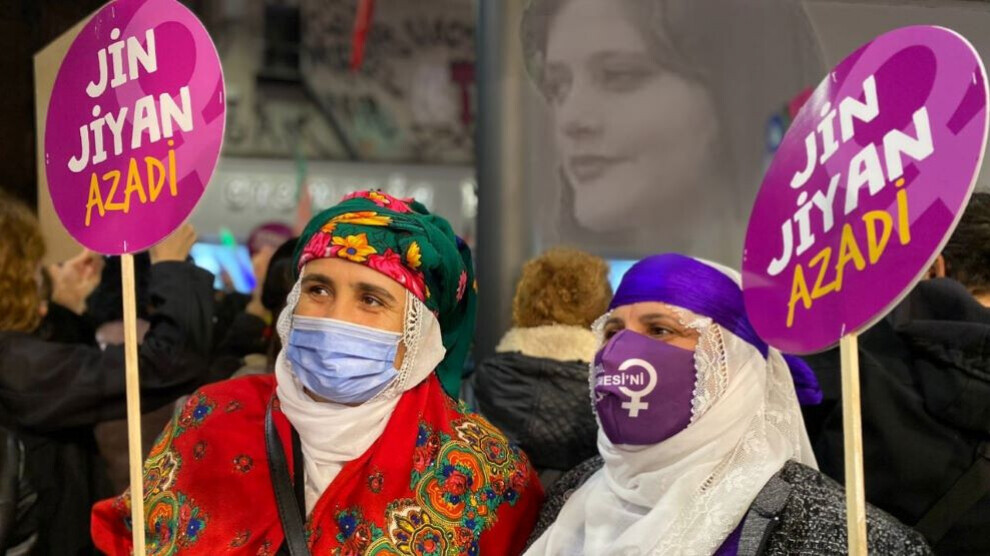If it weren't for "Jin jiyan azadî"
A commentary by Jiyan Tekoşin, who reminds us that the protests that flare up when yet another woman is murdered will only lead to their goal if they become a permanent, organised and conscious stream.
A commentary by Jiyan Tekoşin, who reminds us that the protests that flare up when yet another woman is murdered will only lead to their goal if they become a permanent, organised and conscious stream.

If we do not properly understand the triple sentence "Jin, jiyan, azadî" (Woman, life, freedom), we may also forget that every single murdered woman is a reason for revolution. The organised struggle for our existence, life and freedom is the task of every woman. Nietzsche already said that those who talk most about morality would often live very immorally. This insight comes to mind when I look at the practice of the Iranian "morality police". How can those who legitimise violence and the deaths of women like Jina Mahsa Amini watch over morality? After all, they are the ones who wear a veil by the state while living the greatest immorality.
In the stranglehold of genocide
In Kurdistan, women are confronted with different strategies of extermination. A genocide of society, culture and ethics is wanted to be carried out through women. In his defence writings on the cultural genocide of the Kurdish people, Abdullah Öcalan emphasises that a society that has lost its moral principles also loses its political memory and therefore becomes a society that renders itself defenceless. As Kurds, we are experiencing the best example of this today. Who can speak of sincere morality in a society where women are murdered every day? Who can speak of political progress in a society where the reality of women, who are the mirror of society, is unchanged? Above all, for a society caught in the stranglehold of genocide, struggling to defend itself and free itself from its deadly grip, it is important to look at the concepts of morality, politics and self-defence and draw conclusions. Without these three basic pillars of a society, the state that wants to destroy that society will attack and target the women of that society every day. We have seen examples of this in many states, most notably Turkey. When it comes to Kurdistan and the Kurds, the attacks on women become even more massive. The most recent example of this is Rojhilat, the east of Kurdistan.
If we want to achieve something
The Kurdish people have not been silent about the death of Jina, who was murdered in Tehran. They have risen up with great anger in Rojhilat and Iran. Moreover, women in many parts of the world, especially in the other parts of Kurdistan, have shown their willingness to fight. This shows how strong the feeling of solidarity is among women. However, if this energy only kicks in for a short time when women are murdered again, and it does not develop into a permanent current, no organised self-defence can emerge. If women want to achieve something in the struggle, it is existentially important to put the principles of organising, struggle and self-defence into practice. Because it is a matter of existence. We are talking about dirty machinations and a campaign of destruction against the mentality and culture of an entire society. The realisation of this goal on the backs of the women who build social life springs from a patriarchal-etatist ideology.
The most inspiring inspiration from which women can draw the necessary strength to oppose this work is the struggle of the Kurdish freedom guerrillas. The YJA Star (Free Women’s Troops), which fights for freedom in the mountains and resists the Turkish army, inspires the whole world. We know very well that this stage was not reached easily. Why did Abdullah Öcalan put the establishment of a women's army and women's capacity for self-defence on the agenda with so much emphasis? Why did he think that women must organise themselves autonomously? Why did he propose the formula "Jin jiyan azadî"?
Whenever problems arise again in our country, Abdullah Öcalan's perspectives act as a wake-up slap in the face. If we do not combine his foresight with the existing legacy and draw the right conclusions from it, we may forget that every single woman who is murdered is a reason for revolution.
It is the responsibility of every single woman
We know that to forget is to lose oneself. And we know that our struggle as women, our struggle for freedom, means creating our true existence. In other words: we must not forget the Yazidi women abducted in Shengal. We must not forget Zeynab Jalalian in Rojhilat and Ekin Van, who was murdered in Bakur and whose disfigured naked body was put on display. We must not forget the women politicians whose will is to be broken by the smear campaign against Semra Güzel. We must never forget Sakine Cansız (Sara) and her comrades Fidan Doğan and Leyla Şaylemez, who were murdered in Paris. Therefore, it is the responsibility of every woman to organise and fight for freedom in order to protect our own existence. It is time to accept this mission, to fulfil our mission and to shape our own freedom.